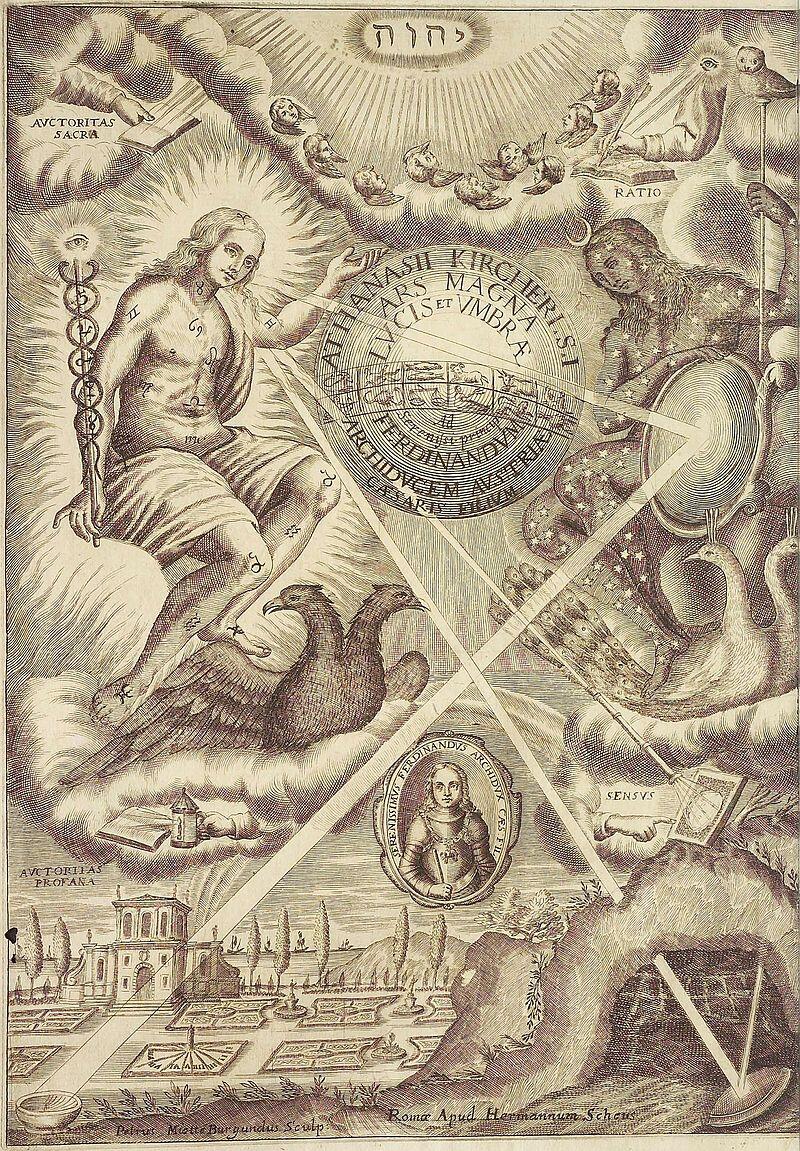
"Disperse the shadows of the soul with splendid rays, so that your light be mine, and my light, yours." [Athanasius Kircher]
Athanasius Kircher (2 May 1602 – 27 November 1680) was a German Jesuit scholar and polymath who published around 40 major works, most notably in the fields of comparative religion, geology, and medicine. Kircher has been compared to fellow Jesuit Roger Joseph Boscovich and to Leonardo da Vinci for his enormous range of interests, and has been honoured with the title "Master of a Hundred Arts". He taught for more than 40 years at the Roman College, where he set up a wunderkammer. A resurgence of interest in Kircher has occurred within the scholarly community in recent decades.
Kircher claimed to have deciphered the hieroglyphic writing of the ancient Egyptian language, but most of his assumptions and translations in this field were later found to be incorrect. He did, however, correctly establish the link between the ancient Egyptian and the Coptic languages, and some commentators regard him as the founder of Egyptology. Kircher was also fascinated with Sinology and wrote an encyclopedia of China, in which he noted the early presence there of Nestorian Christians while also attempting to establish links with Egypt and Christianity.
Kircher's work in geology included studies of volcanoes and fossils. One of the first people to observe microbes through a microscope, Kircher was ahead of his time in proposing that the plague was caused by an infectious microorganism and in suggesting effective measures to prevent the spread of the disease. Kircher also displayed a keen interest in technology and mechanical inventions; inventions attributed to him include a magnetic clock, various automatons and the first megaphone. The invention of the magic lantern is often misattributed to Kircher, although he did conduct a study of the principles involved in his Ars Magna Lucis et Umbrae.
A scientific star in his day, towards the end of his life he was eclipsed by the rationalism of René Descartes and others. In the late 20th century, however, the aesthetic qualities of his work again began to be appreciated. One modern scholar, Alan Cutler, described Kircher as "a giant among seventeenth-century scholars", and "one of the last thinkers who could rightfully claim all knowledge as his domain". Another scholar, Edward W. Schmidt, referred to Kircher as "the last Renaissance man". In A Man of Misconceptions, his 2012 book about Kircher, John Glassie writes that while "many of Kircher's actual ideas today seem wildly off-base, if not simply bizarre," he was "a champion of wonder, a man of awe-inspiring erudition and inventiveness," whose work was read "by the smartest minds of the time." wikipedia
THE MAN WHO KNEW EVERYTHING
Athanasius Kircher (1602-1680) was a German Jesuit, scientist, philosopher, and writer, known for his works in various fields of science, including physics, mathematics, astronomy, archeology, linguistics, and medicine. However, Kircher was also interested in occultic and metaphysical themes, and considered some of these themes in his works.
Kircher, for example, studied alchemy and hermetism, and wrote about how the material world can be transformed through processes such as transmutation. He also studied astrology and cabalism, and wrote about symbolism and secrets hidden in the language.
However, it is important to note that Kircher’s research has always been based on scientific methodology and has not accepted scientific claims without evidence. Therefore, it can be said that Kircher studied occultic and metaphysical topics, but that he always looked for rational explanations and evidence for his theories.
Kircher was one of the most prominent scientists of his time and is credited as one of the greatest encyclopedists in history.
Kircher's work covered a wide range of topics including studying volcanoes and earthquakes, deciphering Egyptian hieroglyphs, exploring Chinese culture, and writing about music and acoustics. His best-known works include "Mundus Subterraneus", "Ars Magna Lucis et Umbrae", and "Oedipus Aegyptiacus".
Athanasius Kircher was known for his works in the field of music and acoustics. In his works he researched the physics of sound and harmony, and developed a number of innovative ideas and theories.
Kircher developed a theory of the musical chord as a mathematical equation, which he called the "musical square". This square is made up of numbers representing the frequencies of tones, and it allowed to calculate the intervals between tones and the creation of harmonious chords.
Kircher also studied a variety of musical instruments, including the organ, the stringed, and the brass. He developed the idea of "musical snakes", organ-like instruments used by mechanical snakes to produce sound.
Kircher also studied the study of voice and human speech, and developed a theory of "mouth vibrations" that explains how sound is created in the mouth and throat.
Overall, Kircher's research in the field of music had a great impact on the development of music and acoustics in later centuries.
Kircher was also known for his innovative ideas, such as the idea of a "universal language", which would be a solution to language barriers between people. His ideas and works influenced scientists and philosophers during the 17. and 18. centuries, and his legacy continued to live on through the centuries in many fields of science and culture. [anon]
